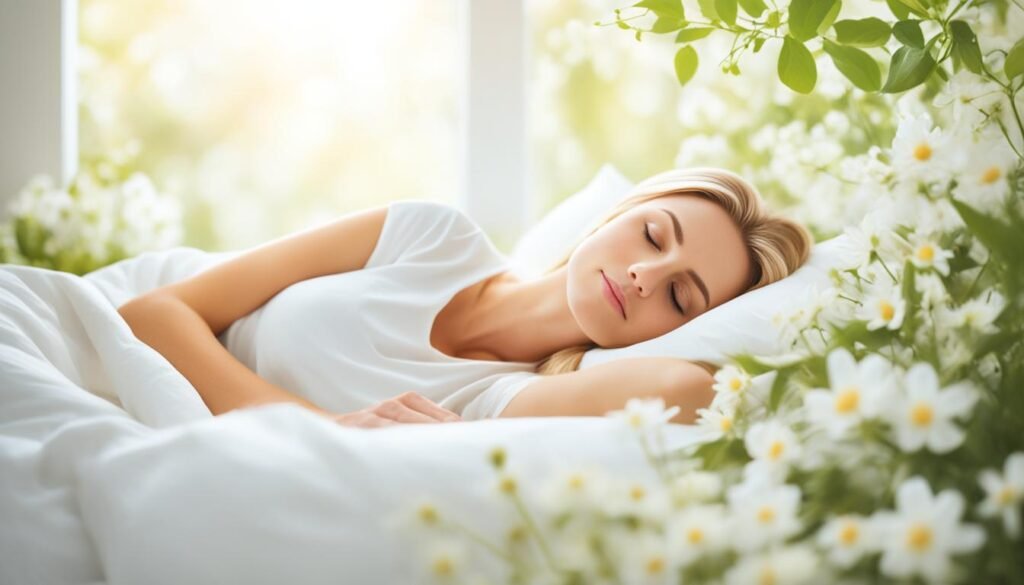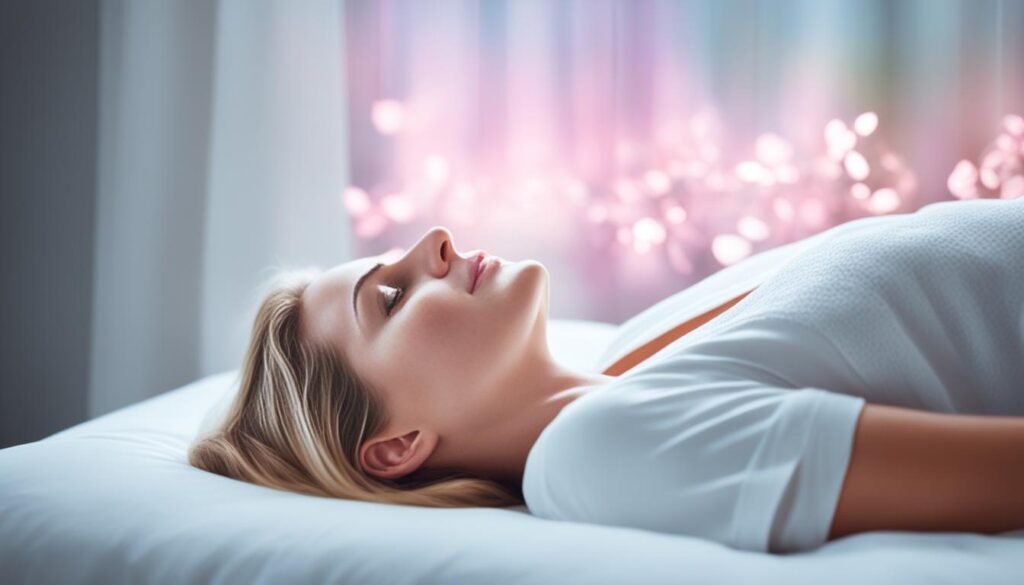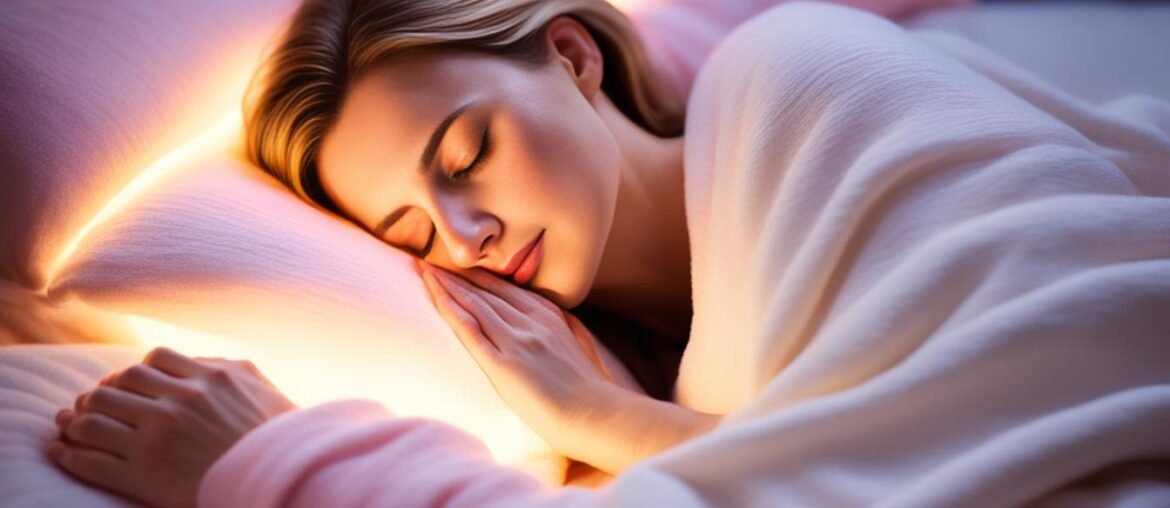Did you know that a lack of good sleep can contribute to various skin issues such as hanging eyelids, swollen eyes, dark under-eye circles, paler skin, more wrinkles and fine lines, and droopy corners of the mouth? On the flip side, getting a full night of sleep can do wonders for your skin glow and overall appearance.
Research has shown that sleep plays a crucial role in maintaining the health and radiance of your skin. During sleep, your body goes through essential recovery processes, including increased blood flow and collagen production, which contribute to skin repair and rejuvenation. By prioritizing good sleep, you can significantly enhance your skin’s glow and ensure a healthier complexion.
Key Takeaways:
- Poor sleep can lead to various skin issues such as hanging eyelids, swollen eyes, and dark under-eye circles.
- Getting a full night of sleep allows your skin to repair itself, increase blood flow, and produce collagen for a healthier complexion.
- Sleep plays a crucial role in the overall rejuvenation of your skin, reducing wrinkles, fine lines, and age spots.
- Prioritizing good sleep can significantly enhance your skin glow and improve your overall skin health.
- By embracing healthy sleep practices, such as getting enough sleep, washing your face before bed, and using moisturizers, you can take steps towards achieving and maintaining a radiant complexion.
The Science Behind Beauty Rest
The concept of beauty rest is backed by scientific research. During sleep, your body and skin go through essential recovery processes. Research indicates that sleep restriction negatively affects perceived attractiveness, health, sleepiness, and trustworthiness. Sleep is the time when your skin’s blood flow increases, collagen is rebuilt, and damage from UV exposure is repaired. It is also the time when your face comes into contact with various elements, such as rough cotton or exposure to the sun. Prioritizing good sleep can enhance your skin health and promote a glowing complexion.
Difficulties with sleep can have a visible impact on your skin. Studies have shown that sleep deprivation can lead to various skin issues, including dullness, dark circles, and premature aging. Lack of sleep affects your skin’s ability to retain moisture, which can result in dryness, flakiness, and a lackluster appearance. Additionally, chronic lack of sleep can disrupt the balance of hormones in your body, leading to increased inflammation and oxidative stress, both of which contribute to skin aging.
Adequate and quality sleep is essential for maintaining the health and vitality of your skin. It allows your body to repair and regenerate skin cells, boost collagen production, reduce inflammation, and promote proper hydration. By giving your body the sleep it needs, you are providing the optimal environment for your skin to thrive.
Benefits of good sleep for skin:
- Enhanced skin barrier function
- Increased collagen production
- Improved skin elasticity
- Reduced appearance of wrinkles and fine lines
- Decreased skin inflammation
- Prevention of skin dullness and dark circles
- Promotion of skin cell regeneration
“Getting enough sleep is crucial for maintaining healthy and radiant skin. It’s the time when your skin can repair itself and regain its natural glow. Adequate sleep allows for proper circulation and oxygenation of the skin, resulting in a more youthful and vibrant complexion.”
So, if you want to achieve that coveted healthy and glowing skin, make sure to prioritize your sleep. Create a bedtime routine, establish a comfortable sleep environment, and practice good sleep hygiene habits to ensure you get the restorative sleep your skin needs. Remember, beauty truly does come from within, and that includes plenty of quality sleep.
The Impact of Sleep on Skin Appearance

The effects of sleep on skin appearance can be quite noticeable. Poor sleep can lead to a tired and aged look, with hanging eyelids, swollen eyes, dark under-eye circles, paler skin, wrinkles, and droopy corners of the mouth. On the other hand, getting enough sleep can improve skin radiance and rejuvenation. Sleep allows the skin to repair damage, increase blood flow, and reduce the signs of aging. Prioritizing good sleep can help maintain a youthful and glowing complexion.
The Visible Effects of Poor Sleep
Poor sleep can have a significant impact on the appearance of your skin. When you don’t get enough restful sleep, your skin may look dull and lackluster, with a tired and aged appearance. Here are some common effects of poor sleep on skin:
- Hanging eyelids: Lack of sleep can cause your eyelids to appear droopy and saggy.
- Swollen eyes: Insufficient sleep can lead to puffiness and swelling around the eyes.
- Dark under-eye circles: Poor sleep can result in the appearance of dark circles under your eyes, making you look tired and older.
- Paler skin: When you don’t get enough rest, your complexion may appear paler and less vibrant.
- Wrinkles: Lack of sleep can exacerbate the formation of wrinkles and fine lines, giving your skin a more aged look.
- Droopy corners of the mouth: Insufficient sleep can contribute to the sagging and drooping of the corners of your mouth.
These visible effects of poor sleep can significantly impact your overall skin appearance, making you look older and less radiant.
The Benefits of Good Sleep for Skin Radiance and Rejuvenation
On the other hand, prioritizing good sleep can have transformative effects on your skin. When you get sufficient restful sleep, your skin has the opportunity to repair, renew, and rejuvenate itself. Here are the ways good sleep can benefit your skin:
- Repairing damage: During sleep, your skin cells undergo repair processes that help heal and reverse damage caused by environmental factors, such as UV exposure and pollution.
- Increased blood flow: Sleep boosts blood circulation, which helps deliver essential nutrients and oxygen to the skin, promoting a healthy and radiant complexion.
- Collagen production: Sleep is also crucial for collagen production, a protein that gives your skin its structure and elasticity. Sufficient collagen levels can reduce the appearance of wrinkles and improve skin firmness.
- Reduced signs of aging: By allowing your skin to repair and regenerate overnight, good sleep can help minimize the signs of aging, such as fine lines, wrinkles, and age spots.
When you prioritize good sleep and give your skin the time it needs to rejuvenate, you can enjoy a more youthful and glowing appearance.
Tips for Enhancing Skin Health Through Sleep
There are several things you can do to enhance your skin health through sleep. Firstly, aim to get a full night of sleep, preferably seven to nine hours each night, to allow your skin ample time for rejuvenation.
It is also essential to wash your face before bed to remove dirt and makeup that can clog pores and cause skin issues. Cleansing your face with a gentle cleanser will help eliminate impurities and create a clean canvas for your skin to repair itself while you sleep.
Using an overnight moisturizer is another key step in your sleep skincare routine. Applying a nourishing and hydrating moisturizer before bed helps prevent dryness and promotes skin hydration. Look for moisturizers with ingredients like hyaluronic acid or ceramides to boost moisture retention.
Staying hydrated throughout the day is crucial for maintaining healthy skin. Drinking enough water helps flush out toxins and keeps your skin plump and radiant. Make sure to drink an adequate amount of water during the day, and avoid excessive caffeine and alcohol intake, as they can dehydrate your skin.
Sleeping on your back or using a special pillowcase can also contribute to healthier skin. Sleeping on your back can help prevent sleep lines or creases that can develop when you press your face against a pillow. Additionally, using a silk or satin pillowcase can reduce friction and potential skin irritation, helping your skin stay smooth and wrinkle-free.
Elevating your head while sleeping can assist in preventing fluid accumulation, reducing puffiness and swelling around the eyes. This can be accomplished by using an extra pillow or an adjustable bed frame, ensuring your head is elevated above the level of your heart.
Avoiding sun exposure while sleeping is essential to prevent UV damage to your skin. Even indoors, UV rays can penetrate windows and affect your skin. Consider using blackout curtains or blinds in your bedroom to minimize sun exposure and protect your skin from potential harm.
Embracing healthy sleep practices can have a significant impact on your skin’s health and appearance. By following these tips, you can enhance your skin’s vitality, promote a youthful glow, and wake up to a rejuvenated complexion.
The Link Between Sleep and Skin Hydration

When it comes to achieving healthy and glowing skin, proper hydration is key. Lack of sleep can contribute to skin dehydration, leading to dryness and a dull complexion. Research suggests that individuals who get less than eight hours of sleep per day have lower levels of skin hydration. Additionally, sleep deprivation can result in decreased skin elasticity, making your skin appear less plump and youthful.
Prioritizing good sleep is essential for maintaining proper skin hydration and promoting a radiant glow. By allowing your body and skin to rest and rejuvenate during a full night’s sleep, you give your skin the opportunity to replenish moisture and repair any damage caused by external factors such as sun exposure or environmental pollutants.
Ensuring that you get enough sleep each night is just as important as following a consistent skincare routine. By combining the benefits of a proper sleep schedule with a hydrating skincare routine, you can enhance your skin’s natural radiance and improve its overall health.
Choosing the Right Bedding for Skin Health
The type of bedding you use can have a significant impact on your skin health. When it comes to maintaining healthy and glowing skin, silk pillowcases and sheets are highly recommended, especially for individuals with acne or sensitive skin. Silk is known for its gentle and smooth texture, which reduces friction and irritation that can worsen skin conditions.
Unlike cotton pillowcases, which can absorb natural oils and bacteria from your face and hair, silk bedding helps to maintain the cleanliness of your skin. By preventing the accumulation of oils, dirt, and bacteria, silk pillowcases promote a cleaner and healthier environment for your skin. This can help prevent acne breakouts and skin issues caused by bacterial growth.
Additionally, silk is hypoallergenic, making it an excellent choice for those with sensitive skin or allergies. It is less likely to cause skin irritation or allergic reactions compared to other fabrics. The smooth surface of silk also prevents the formation of sleep creases and reduces the development of fine lines and wrinkles.
Investing in silk bedding is a worthwhile choice for promoting skin health and preventing skin problems. By opting for silk pillowcases and sheets, you can minimize friction, reduce inflammation, and maintain the integrity of your skin. This, combined with good sleep practices, will contribute to healthier, smoother, and more radiant skin.
Key Takeaways:
- Choose silk pillowcases and sheets for healthier skin, especially for acne-prone or sensitive skin.
- Silk reduces friction and inflammation, preventing skin conditions from worsening.
- Silk bedding prevents the accumulation of dirt, oils, and bacteria, reducing the risk of acne breakouts and skin issues.
- Silk is hypoallergenic and less likely to cause skin irritation or allergic reactions.
- Investing in silk bedding helps minimize sleep creases, fine lines, and wrinkles.
The Relationship Between Sleep and Skin Redness

Sleep deprivation can have a significant impact on skin health, particularly in individuals with conditions such as rosacea. Research suggests that sleep disruption can worsen symptoms of skin redness in those with rosacea. While more studies are needed to fully understand the connection between sleep and skin redness, prioritizing good sleep is essential for overall skin health and the reduction of skin redness.
One study conducted on individuals with rosacea found that poor sleep quality and longer sleep onset time were associated with increased facial redness. Another study revealed that sleep deprivation can lead to increased inflammation in the body, which may contribute to skin issues such as redness and sensitivity.
Although the exact mechanisms linking sleep and skin redness are yet to be determined, it is evident that sleep plays a vital role in regulating the body’s inflammatory response, which can affect the appearance of the skin.
To support overall skin health and minimize skin redness, it is crucial to prioritize good sleep habits. This includes establishing a consistent sleep schedule, creating a sleep-friendly environment, and practicing relaxation techniques to promote better sleep quality. Additionally, avoiding potential triggers for skin redness, such as hot or spicy foods, excessive sun exposure, and alcohol, can supplement the benefits of good sleep.
The Importance of Sleep for Skin Rejuvenation
Sleep is an essential time for the skin’s rejuvenation process. During sleep, the body undergoes various physiological changes that promote skin repair and regeneration. This includes increased blood flow to the skin, allowing necessary nutrients and oxygen to reach the cells.
Additionally, sleep is when the body produces collagen, a protein that provides structure and elasticity to the skin. Collagen production helps reduce the appearance of fine lines and wrinkles, contributing to a more youthful and glowing complexion. Lack of sleep can disrupt collagen production, leading to premature aging of the skin.
Furthermore, sleep allows the skin to recover from environmental factors that can cause damage, such as sun exposure and pollution. By getting sufficient sleep, individuals give their skin the opportunity to repair and protect itself.
| Sleep and Skin Rejuvenation | Effects |
|---|---|
| Promotes collagen production | Reduces the appearance of wrinkles and fine lines |
| Increases blood flow to the skin | Enhances nutrient delivery and skin health |
| Allows the skin to repair damage | Reduces inflammation and supports healing |
Getting enough high-quality sleep is crucial for skin rejuvenation and maintaining a healthy, youthful appearance.
The Benefits of Sleep for Overall Health and Skin
Good sleep is not only crucial for skin health but also for overall physical and mental well-being. Adequate sleep has been linked to a lower risk of various health conditions, including type II diabetes, heart disease, and mental health challenges. By prioritizing good sleep, you are not only promoting a glowing complexion but also supporting your overall health and wellness.
Achieving Healthy and Glowing Skin through Good Sleep
When it comes to achieving healthy and glowing skin, the benefits of a good night’s sleep cannot be overlooked. Quality sleep plays a vital role in rejuvenating and repairing your skin, giving it that radiant and fresh appearance.
A lack of good sleep can lead to numerous skin issues, such as hanging eyelids, swollen eyes, dark under-eye circles, paler skin, wrinkles, and droopy corners of the mouth. On the other hand, getting enough sleep allows your skin to repair itself, increase blood flow, and encourage collagen production. These factors contribute to reducing wrinkles and age spots, improving overall skin texture, and promoting a healthy and vibrant complexion.
Aside from the visible benefits, sleep also impacts the internal health of your skin. During sleep, your body carries out essential processes to repair and regenerate cells, including those in your skin. Proper sleep ensures the optimal function of your immune system, which helps protect your skin from infections and inflammation.
The Role of Sleep in Skin Rejuvenation and Healing
When you sleep, your body enters a state of repair and regeneration. This is especially true for your skin. Research has shown that during sleep, your skin’s blood flow increases. This increased blood flow delivers vital nutrients and oxygen to your skin cells, aiding in their repair and rejuvenation. Not only does this process help in reducing skin damage caused by external factors like UV exposure, but it also promotes healthy skin cell turnover, resulting in a more youthful and radiant complexion.
Furthermore, sleep is also crucial for the balance of hormones that affect your skin health. During deep sleep, your body releases growth hormone, which is responsible for stimulating cell renewal and collagen production, leading to firmer and more elastic skin. Lack of sleep can disrupt hormone balance, increasing the risk of skin issues such as acne and inflammation.
To ensure maximum skin rejuvenation and healing, it is essential to prioritize adequate sleep. Aim for 7 to 9 hours of quality sleep each night to reap the full benefits for your skin and overall health.
Promoting Skin Health and a Glowing Complexion
In addition to the direct impact on skin health, good sleep also contributes to overall well-being, which can indirectly improve the appearance of your skin. When you sleep well, you wake up feeling refreshed and energized, reducing stress levels and promoting a positive mood. Stress is known to negatively impact skin health, leading to breakouts, dullness, and premature aging. By prioritizing good sleep, you can minimize stress and enhance your skin’s natural radiance.
Furthermore, sleep deprivation can lead to imbalances in your body’s hydration levels, resulting in dry and dull-looking skin. During sleep, your body regulates water balance, preventing dehydration and enhancing skin hydration. Ensuring adequate sleep can promote healthy skin moisture levels, leading to a naturally vibrant and glowing complexion.
Conclusion
The impact of good sleep on skin glow is undeniable. Prioritizing quality sleep is not only essential for your physical and mental well-being but also for achieving healthy and radiant skin. By understanding the benefits of good sleep for your skin, you can take significant steps toward improving your skin’s appearance and overall health.
To enhance your skin’s glow, ensure you get a full night of sleep, aiming for seven to nine hours each night. This allows your skin enough time to repair and rejuvenate itself, increasing blood flow and collagen production. Additionally, remember to wash your face before bed to remove dirt and makeup that can clog pores and cause skin issues.
Using moisturizers and opting for silk bedding can further contribute to your skin’s health. Silk pillowcases are gentle on the skin and reduce friction, minimizing inflammation and breakouts. Embracing other healthy sleep habits, such as elevating your head and avoiding sun exposure while sleeping, can also support your skin’s radiance and rejuvenation.
Remember, good sleep is not just about looking and feeling refreshed. It is a vital component of your overall well-being, including your skin’s health. By prioritizing good sleep, you are investing in yourself and taking care of your skin from the inside out.
FAQ
What is the impact of good sleep on skin glow?
Good sleep plays a crucial role in maintaining the health and appearance of your skin. It allows your skin to repair itself, increase blood flow, and produce collagen, leading to a more radiant and glowing complexion.
How does sleep affect skin radiance and rejuvenation?
During sleep, your body and skin go through essential recovery processes. It is the time when your skin’s blood flow increases, collagen is rebuilt, and damage from UV exposure is repaired. Prioritizing good sleep can enhance skin radiance and promote rejuvenation.
What are some tips for enhancing skin health through sleep?
Aim to get a full night of sleep, wash your face before bed, use moisturizers, opt for silk bedding, and maintain other healthy sleep habits to enhance your skin health and promote a glowing complexion.
Does sleep affect skin hydration?
Yes, lack of sleep can contribute to skin dehydration, leading to dryness and a dull complexion. Prioritizing good sleep helps maintain proper skin hydration and promotes a radiant glow.
How does choosing the right bedding impact skin health?
Using silk pillowcases and sheets can reduce friction and inflammation that can worsen skin conditions. Cotton pillowcases, on the other hand, can absorb natural oils and bacteria from your face and hair, potentially causing acne and other skin issues.
Is there a relationship between sleep and skin redness?
While more research is needed, sleep disruption is believed to worsen symptoms of conditions like rosacea. Prioritizing good sleep can support overall skin health and minimize skin redness.
What are the benefits of sleep for overall health and skin?
Adequate sleep has been linked to a lower risk of various health conditions, including diabetes, heart disease, and mental health challenges. By prioritizing good sleep, you not only promote a glowing complexion but also support your overall physical and mental well-being.
How does sleep affect skin appearance?
Lack of sleep can contribute to a tired and aged look, with hanging eyelids, swollen eyes, dark under-eye circles, paler skin, wrinkles, and droopy corners of the mouth. Getting enough sleep improves skin appearance by reducing these signs of fatigue and supporting overall rejuvenation.
How does sleep impact skin health?
Sleep allows the skin to repair damage, increase blood flow, and reduce the signs of aging. Prioritizing good sleep supports overall skin health and helps maintain a youthful and glowing complexion.




